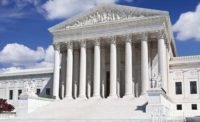The U.S. Supreme Court ruled Dec. 4 against the federal government in a property “takings” case involving water releases from an Army Corps of Engineers Dam. The court also heard oral arguments in two Clean Water Act cases on Dec. 3 and 4.
Although none of the cases touched on the broader question of federal versus state jurisdiction in issuing permits, construction groups are keeping a watchful eye on all three.
Nick Goldstein, American Road & Transportation Builders Association vice president of environmental and regulatory affairs and assistant general counsel, says, “The agencies keep trying to expand jurisdiction, so if there is anything in [the court’s] rulings that stops that, that’s good for construction.”
In its Dec. 4 ruling, the court held that federally directed flooding, even if temporary, can be considered a government “taking” of private property under the Fifth Amendment, and thus damage caused by the flooding could warrant compensation.
The 8-0 opinion in Arkansas Game and Fish Commission v. U.S is a defeat for the federal government, which had argued that water releases from a Corps of Engineers dam were temporary and did not constitute a taking.
The Arkansas commission contended that the flooding from Corps water releases every year between 1993 and 1999 from Clearwater Dam destroyed valuable timber on land it owned and was a taking.
Writing for the majority, Associate Justice Ruth Bader Ginsburg said, “No decision of this court authorizes a blanket temporary-flooding exception to our Takings Clause jurisprudence, and we decline to create such an exception in this case.”
The opinion added, “We rule...simply and only, that government-induced flooding temporary in duration gains no automatic exemption from Takings Clause inspection.”
The Court of Federal Claims in 2009 sided with the commission, awarding it $5.8 million. But in March 2011, a federal appeals court reversed the claims court’s ruling.
The court also heard oral arguments in two Clean Water Act (CWA) cases on Dec. 3 and 4. The first, a consolidation of two cases—Doug
Decker v. Northwest Environmental Defense Center, and Georgia-Pacific West, Inc. v. Northwest Environmental Defense Center, centered on the question of whether the CWA requires logging companies to obtain permits for stormwater runoff from ditches and culverts on roads used for harvesting and transporting lumber.
The Environmental Protection Agency has traditionally said that stormwater runoff from logging is not subject to a permit, and on Nov. 30, finalized regulations clarifying that assertion.
Deputy Solicitor General Malcolm Stewart, who represented the federal government, argued that the EPA’s new rule “renders the case moot.”
Chief Justice John Roberts chided Stewart for failing to notify the court earlier about the rule. “There were 875 pages on the merits briefing in this case, and if we knew that the final rule was imminent, we could have rescheduled the case for April or something along those lines,” Roberts said.
The attorney for the Northwest Environmental Defense Center, Jeffrey L. Fisher, countered that the new rule “simply violates" the Clean Water Act and predicted that groups would file citizen lawsuits to challenge the new rule.
The second case, Los Angeles Flood Control District v. Natural Resources Defense Council, looked at whether the flood control district, which discharges into the Los Angeles and San Gabriel Rivers, violated its State Pollutant Discharge Elimination System permit when monitors within its river system showed that water quality standards were exceeded hundreds of times.
The flood control district argued that because industrial and other sources also discharged water into the system, it could not be proved that the district was responsible for the excess pollutants. Therefore, the flood district argued, no permit violation occurred.
Aaron Colangelo, the attorney for NRDC and the Santa Monica Baykeeper, said that it was the flood district's responsibility to pinpoint which sources might be causing the water quality standards to be exceeded. “What they have failed to do,” Colangelo said, “is to apportion responsibility among the multiple contributors.”
Associate Justice Antonin Scalia said, “They haven’t done so, so what?”
“That is a permit violation,” Colangelo replied.
The Supreme Court is expected to issue rulings in the two CWA cases before June 30.




Post a comment to this article
Report Abusive Comment